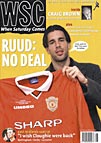 Germany always manage to fluke their way through tournaments undeservingly. Or not, says Uli Hesse-Lichtenberger
Germany always manage to fluke their way through tournaments undeservingly. Or not, says Uli Hesse-Lichtenberger
Oliver Neuville, the speedy Leverkusen winger who was so desperately out of form, pulled the ball back and Christian Ziege hit it first time. It was the Germans’ first serious shot at the Dutch goal, in fact their first half way ambitious foray into the opponents’ box. It also levelled the game at 1-1, as Edwin van der Sar failed to narrow the angle properly.
For the next six minutes, the Dutch ran around like men in shock. So far they had outplayed, outwitted and generally outclassed the Germans. But this unexpected goal seemed to distract them. The same thing had happened during a friendly in November 1998. Then the Dutch led 1-0 and missed sitter after sitter, until Olaf Marschall suddenly equalised, whereupon Holland abruptly stopped playing.
One can find many possible explanations for this mental block, but to me it seemed that the Dutch, very plainly, were afraid. Afraid not of the individuals they were playing against but of a myth: no matter what the score is, no matter how badly the Germans are playing, they will always come back and beat you in the end (sometimes on penalties). In other words, the Dutch suddenly remembered that, when you play Germany, the laws of the game are no longer in force.
This myth may be the most persistent in international football. I myself grew up as a member of the “Gijón generation” – people who were of an impressionable age when Germany and Austria gave their infamous performance there in the 1982 World Cup – and watched in amazement as a mediocre national team cheated its way to two World Cup finals, winning two penalty shoot-outs and twice coming back from a two-goal deficit along the way. That was undeniably formative, and I found myself on the one hand loathing the team, on the other hand being deeply convinced that they would indeed always find a way to win, be it in extra time or even later.
Yet both historically and from a professional point of view, this belief is nothing but hot air. Until roughly 1972, the Germans were anything but invincible escapologists. I grant you the 1954 World Cup, but that appeared to be an aberration. Take the day in 1936, when a German team cracked under pressure and lost 2-0 to a weak Norway side at the Olympics in their own country. Or the semi-final of the 1958 World Cup against Sweden, when Erich Juskowiak lost his head, was sent off and Germany went out after leading 1-0. Then there was Wembley in 1966; a 4-3 loss against Italy at the 1970 World Cup (despite scoring a last-minute equaliser and going ahead in extra time); and a shocking goalless draw in Albania in between, which kept Germany out of the 1968 European Championship finals.
Between 1972 and 1976, Germany simply had a marvellous team, which no one could accuse of playing ugly football (although they still lost on penalties to Czechoslovakia in the 1976 European Championship final when Uli Hoeness missed his spot kick). And in the 1990s, Germany went out of two World Cups rather early, lost a Euro final to Denmark and have taken up the habit of being beaten by the USA. Hardly the stuff of legend.
And so we are left with two World Cups, 1982 and 1986. Neither was won, thank God. That’s the nucleus of the myth, and all the other trophies can simply be put down to the fact that, for five decades, Germany have always had at least a half-decent team, while every other nation went through periods where even average talent was unavailable.
The other problem with the myth, what I’d call the “professional” aspect, is that luck has nothing to do with who wins football games. It’s luck when you fail to execute the offside trap and the linesman suddenly waves his flag regardless. But it’s not luck if your opponents hit the post with regularity while you convert your only chance of the game. To blame fate or Lady Luck for failing to do the one thing that really counts means closing your eyes to the fact that your team is not a complete team. Complete teams are teams that win. That’s it.
Six minutes after Ziege’s goal, Ronald de Boer crossed the ball into the box. The German right-back momentarily lost sight of Zenden, who volleyed past Oliver Kahn. From then on, the Dutch were in command again. Kluivert, Seedorf and Hasselbaink missed easy chances, Zenden hit the post. Sixty seconds from time, the Germans suddenly had a chance to equalise. They missed.
From WSC 160 June 2000. What was happening this month